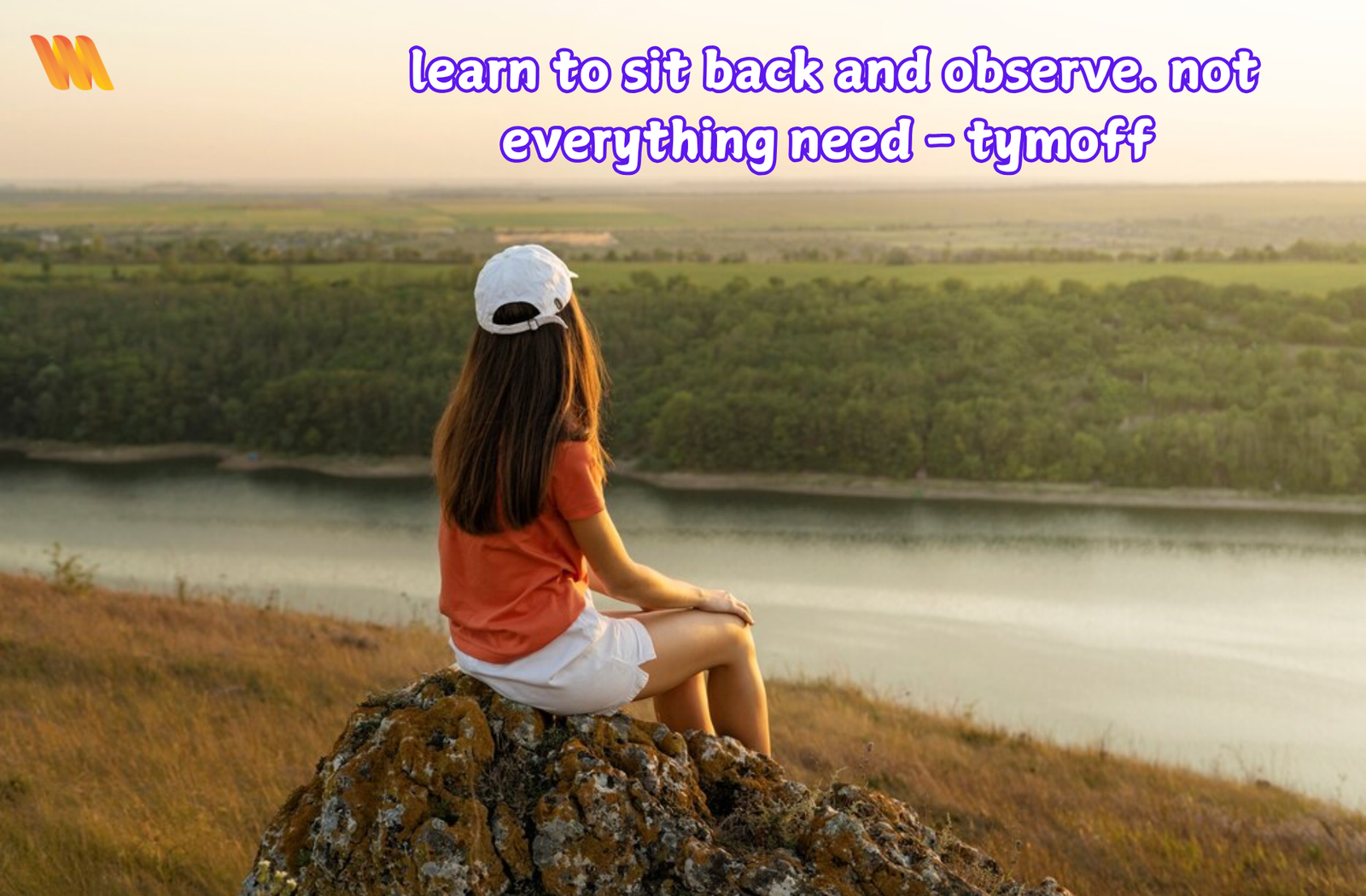(Learn to Sit Back and Observe. Not Everything Need – Tymoff) In a world that is constantly moving at a fast pace, it can be easy to get caught up in the hustle and bustle of daily life. We often feel like we need to be involved in everything, from social events to work projects and even the personal struggles of others.
(Learn to Sit Back and Observe. Not Everything Need – Tymoff) However, there is great value in learning to sit back and observe, rather than always jumping in to fix or react to every situation. This mindset shift can bring about more peace of mind, better decision-making, and a more fulfilling life. The concept of “not everything needs your attention” aligns with this philosophy and is essential for those looking to improve their mental well-being and relationships.
Understanding the Concept: Why “Not Everything Needs Your Attention”?
(Learn to Sit Back and Observe. Not Everything Need – Tymoff)
(Learn to Sit Back and Observe. Not Everything Need – Tymoff) The need to constantly engage in every conversation, event, or problem that arises is a behavior driven by the fear of missing out (FOMO), the desire for control, or the urge to be needed. But in truth, not everything requires your immediate attention or input. The power of observation lies in the ability to step back, assess situations from a distance, and choose your actions carefully.

(Learn to Sit Back and Observe. Not Everything Need – Tymoff) This mindset is especially crucial in today’s digital age, where constant notifications, emails, and messages demand our attention. The idea of sitting back and observing challenges the need for instant reactions and helps us avoid the emotional drain that comes from being “always on.”
(Learn to Sit Back and Observe. Not Everything Need – Tymoff) Tymoff, a term gaining traction in personal growth circles, emphasizes this very idea: “not everything needs your attention.” It’s about learning to evaluate what matters most and knowing when it’s okay to step back, watch, and wait. Instead of rushing to take action or make a comment, you allow situations to unfold and respond only when necessary, if at all.
The Benefits of Learning to Sit Back and Observe
Learn to Sit Back and Observe. Not Everything Need – Tymoff
- Mental Clarity and Focus
When we’re constantly reacting to every stimulus, our minds become cluttered, and it becomes difficult to focus on what truly matters. By observing from a distance, we can filter out distractions and focus on the bigger picture. This mental clarity allows us to make better decisions, be more present in our personal lives, and remain calm in high-pressure situations. - Less Stress and Emotional Exhaustion
Engaging in every drama or situation can lead to emotional exhaustion. The more we involve ourselves in others’ problems or take on unnecessary responsibilities, the more drained we become. By observing rather than participating, we protect our energy and maintain a sense of peace. We can still care and offer support, but without feeling the weight of every issue. - Improved Relationships
Sometimes, the best thing you can do for your relationships is to give others the space to solve their own problems. Constantly jumping in to offer advice or help can inadvertently create dependency or frustration. By sitting back and observing, you allow people to grow, learn, and find their way. This can foster more balanced and respectful relationships. - Better Decision Making
When we engage impulsively or get swept up in the moment, we often make decisions that we later regret. Taking a step back allows us to see things more clearly and make decisions with greater intention. In both personal and professional life, this approach helps us avoid mistakes and unnecessary conflicts. - Emotional Resilience
The more we learn to detach ourselves from every small event or interaction, the stronger our emotional resilience becomes. We begin to understand that not every situation requires a response, and we learn to navigate life’s challenges with a sense of calm and stability.

How to Practice Sitting Back and Observing
- Recognize the Triggers
The first step in learning to observe is recognizing when you’re being triggered to react. These triggers could be anything from a heated conversation to a crisis at work. By noticing these moments, you can pause before acting, giving yourself time to assess the situation. - Practice Mindfulness
Mindfulness practices, such as meditation and deep breathing, can help you become more aware of your thoughts and emotions. When you’re mindful, you can better observe situations without automatically reacting to them. Over time, this practice can help you develop a more neutral and calm response to life’s challenges. - Limit Your Exposure
In our digital age, limiting exposure to constant notifications and social media can be incredibly helpful. Set boundaries for when and how often you check your phone or email, and try to be present in the moment instead of reacting to every ping. This will help you feel more grounded and less distracted. - Adopt the “Wait and See” Approach
Instead of jumping into every situation immediately, try adopting a “wait and see” approach. Allow things to unfold naturally before you decide if you need to get involved. This can be particularly helpful in situations that are beyond your control, where reacting prematurely might only complicate matters. - Let Go of the Need to Control
A major part of sitting back and observing is letting go of the need to control everything around you. Understand that you can’t fix everything, and that’s okay. Trust that people and situations will evolve on their own, and sometimes, your role is simply to observe and provide support when needed.
The Tymoff Philosophy: A Shift in Mindset
(Learn to Sit Back and Observe. Not Everything Need – Tymoff)
The Tymoff philosophy challenges us to rethink how we interact with the world around us. It’s not about disengagement or apathy; it’s about choosing where to direct our attention for the sake of our well-being. By learning to sit back and observe, we take control of our mental and emotional health, rather than letting the chaos of life control us. (Learn to Sit Back and Observe. Not Everything Need – Tymoff)
(Learn to Sit Back and Observe. Not Everything Need – Tymoff) It’s easy to feel like we need to be involved in everything to feel valued or needed. However, the truth is, that our worth is not tied to how much we participate in every event or conversation. By learning to observe and detach ourselves from the constant pull of life, we can find a greater sense of peace and balance.

The Art of Sitting Back and Observing: A Path to Mental Clarity
(Learn to Sit Back and Observe. Not Everything Need – Tymoff)
In today’s fast-paced world, we’re often conditioned to respond quickly to everything around us, whether it’s an email, social media notification, or even a conversation. But Tymoff emphasizes a powerful practice: learning to sit back and observe. This doesn’t mean disconnecting entirely from life, but instead taking a step back and allowing situations to unfold without feeling the pressure to react instantly. By observing rather than reacting, we allow ourselves the space to process information more clearly and make more mindful decisions. (Learn to Sit Back and Observe. Not Everything Need – Tymoff)
Not Everything Needs Your Attention: A Key to Focus and Balance
(Learn to Sit Back and Observe. Not Everything Need – Tymoff)
(Learn to Sit Back and Observe. Not Everything Need – Tymoff) One of the biggest challenges we face is the constant bombardment of distractions. Tymoff highlights how, in many instances, we mistakenly give our attention to things that don’t require it. By practicing the art of observing, we can train our minds to filter out unnecessary stimuli. This not only reduces stress but also helps us prioritize what truly matters. It’s a balance between engagement and detachment, where we can appreciate the moment without feeling the need to control every detail.
Frequently Asked Questions (Learn to Sit Back and Observe. Not Everything Need – Tymoff)
1. How can I start practicing sitting back and observing?
Begin by recognizing when you feel the urge to react or engage. Take a moment to pause, breathe, and assess whether your involvement is necessary. Gradually build the habit of observing without immediately responding.
2. Is sitting back and observing a form of avoiding responsibility?
Not at all. It’s about choosing where to focus your energy. Sometimes, observing is the most responsible thing to do, especially when it allows others to grow or when your involvement would only complicate things.
3. Can observing help reduce stress in my life?
Yes! By choosing not to react to every situation or event, you protect your emotional energy and reduce unnecessary stress. This gives you more space to focus on what truly matters.
4. How does this mindset impact my relationships?
This mindset can strengthen relationships by promoting respect for others’ autonomy and creating healthier boundaries. By observing rather than intervening, you allow others to find their own way, fostering mutual trust and understanding.
5. Does the Tymoff philosophy mean I should disengage from everything?
No, it simply encourages a more mindful approach to engagement. You don’t need to be involved in everything. Instead, assess each situation to determine where your attention is truly needed, and act accordingly.
Deal OECD JanuaryLoveJoy9to5Mac: An In-Depth Look at Its Implications






